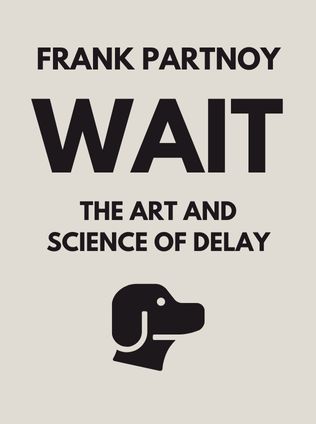
Wait
The Art and Science of Delay
By Frank Partnoy
Published 06/2013
About the Author
Frank Partnoy, the author of Wait: The Art and Science of Delay, is the George E. Barrett Professor of Law and Finance and the founding director of the Center for Corporate and Securities Law at the University of San Diego. Partnoy's extensive career spans various fields, including his time as an investment banker at Morgan Stanley. His multidisciplinary expertise allows him to blend insights from law, finance, psychology, and neuroscience, providing a comprehensive perspective on the importance of timing in decision-making.
Main Idea
In Wait: The Art and Science of Delay, Frank Partnoy explores the counterintuitive concept that delaying our reactions and decisions can lead to better outcomes. He argues that in our fast-paced world, taking control of time and slowing down can profoundly benefit our decision-making processes. By weaving together findings from scientific studies and interviews with experts, Partnoy demonstrates how strategic delay can improve performance in various fields, from sports to business to personal relationships.
Table of Contents
- Introduction
- Hearts and Minds
- Superfast Sports
- High-Frequency Trading, Fast and Slow
- Bad Call
- A Slice Too Thin
- Don't Panic
- At Last, Procrastination
- Master Class
- Get Off the Clock
- A Lifetime of Innovation
- Go Long
Introduction
In the introduction, Partnoy sets the stage by highlighting the critical role of timing in our lives. He notes that recent scientific advances have shed light on how we make decisions, yet the aspect of timing often remains overlooked. Partnoy's thesis is clear: in a world driven by speed, the ability to delay our reactions thoughtfully can turn a good decision into a great one. He emphasizes that both quick intuition and careful analysis have their place, and mastering the art of delay is key to optimal decision-making.
Hearts and Minds
Partnoy delves into the physiological and psychological underpinnings of decision-making, drawing on the work of Stephen Porges, a neuroscientist who focuses on the vagal nerve. The vagal nerve, with its reptilian and mammalian strands, plays a crucial role in our responses to stimuli, affecting everything from our heart rate to our emotional reactions.
"The tortoise part instantly sends signals to withdraw and shut down, like the emergency brake of a car... In contrast, the mammal part of the vagal nerve reacts to stimulation more flexibly, revving up and slowing down the body, as appropriate." - Frank Partnoy
This understanding of our internal reactions helps explain why some people can remain calm and make better decisions under pressure. Partnoy suggests that by understanding these physiological processes, we can train ourselves to manage our responses better and make more deliberate choices.
Sign up for FREE and get access to 1,400+ books summaries.
You May Also Like
The Subtle Art of Not Giving a F*ck
A Counterintuitive Approach to Living a Good Life
By Mark MansonRich Dad Poor Dad
What the Rich Teach Their Kids About Money - That the Poor and Middle Class Do Not!
By Robert T. KiyosakiHow To Win Friends and Influence People
The All-Time Classic Manual Of People Skills
By Dale CarnegieFreakonomics
A Rogue Economist Explores the Hidden Side of Everything
By Steven D. Levitt and Stephen J. Dubner



















